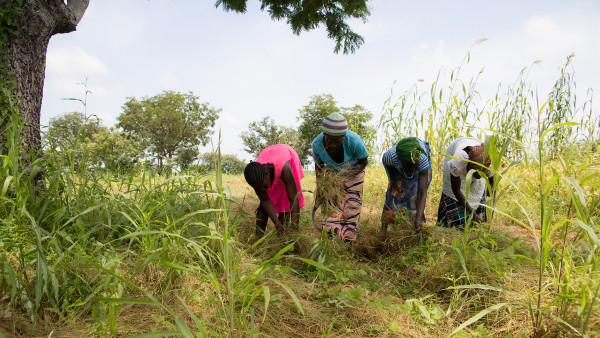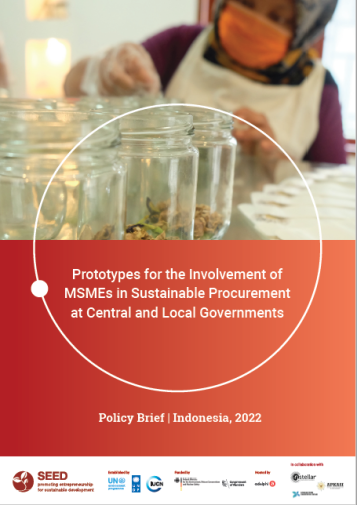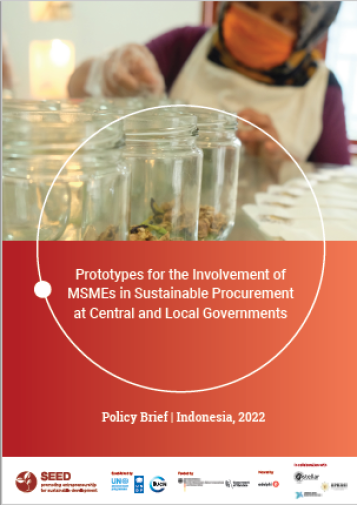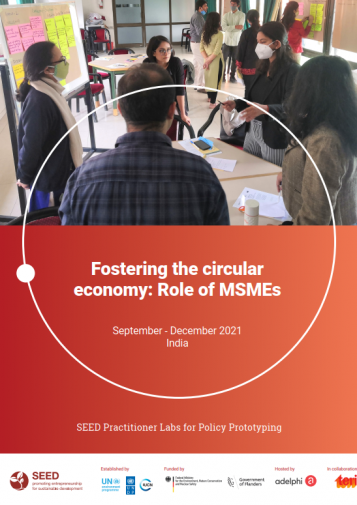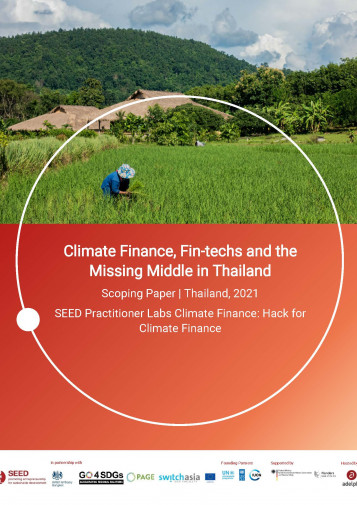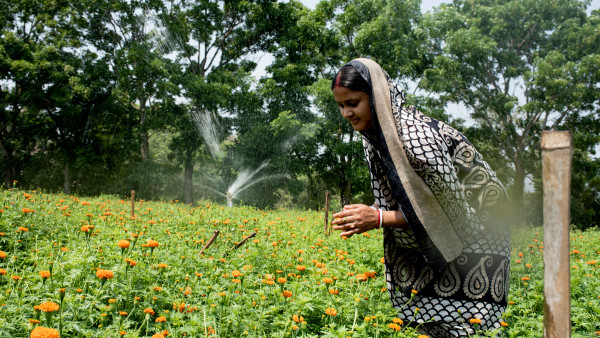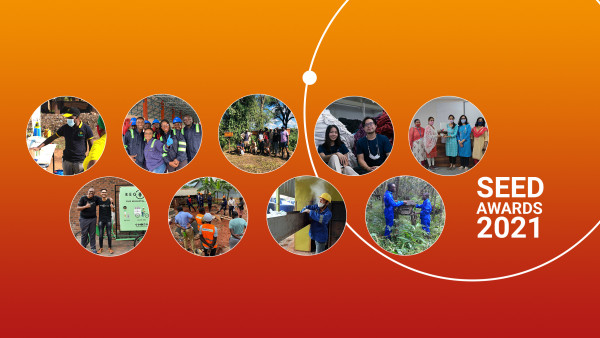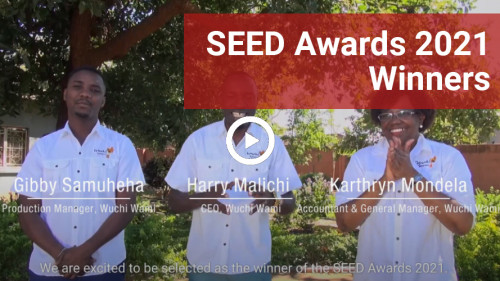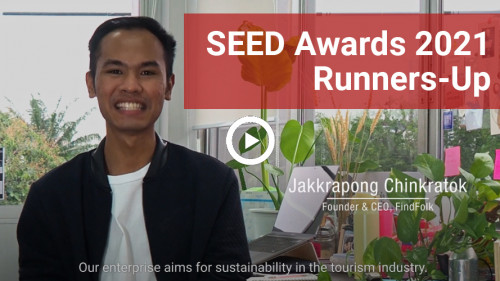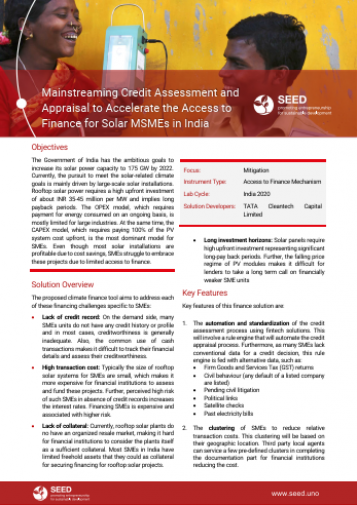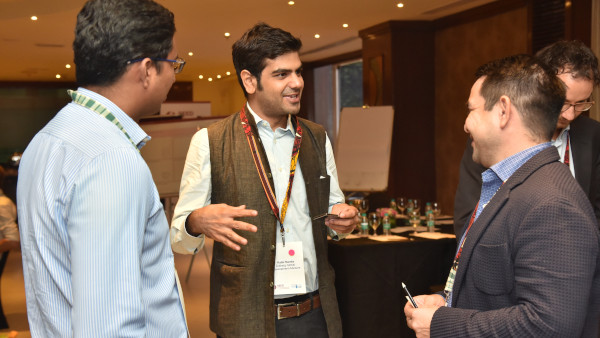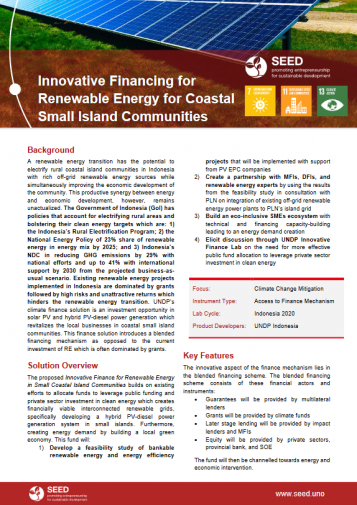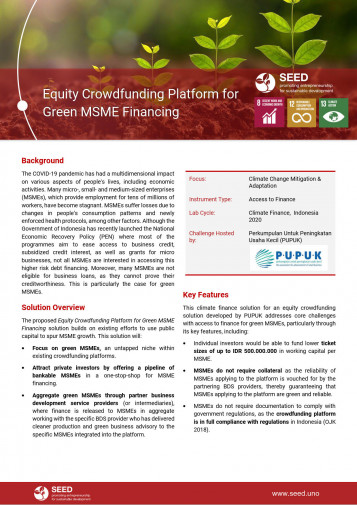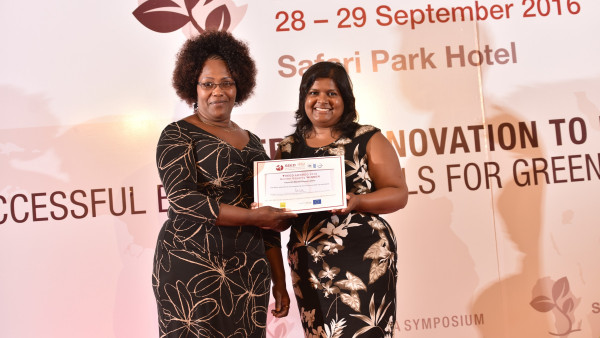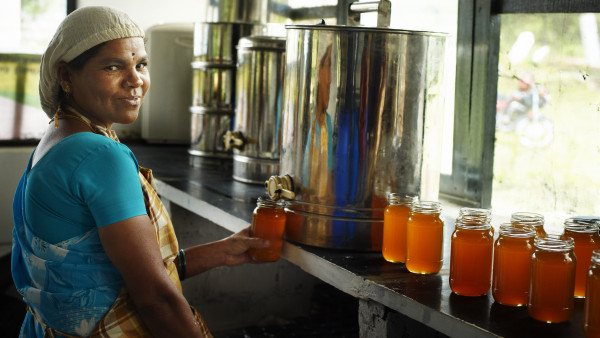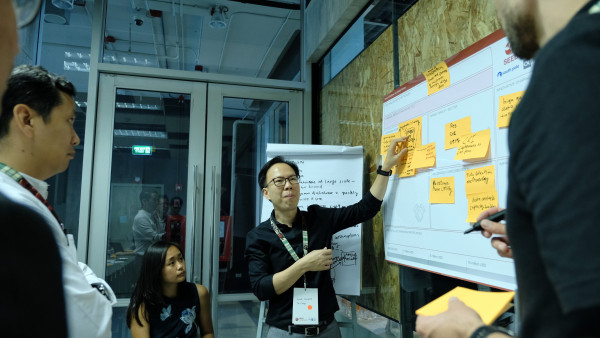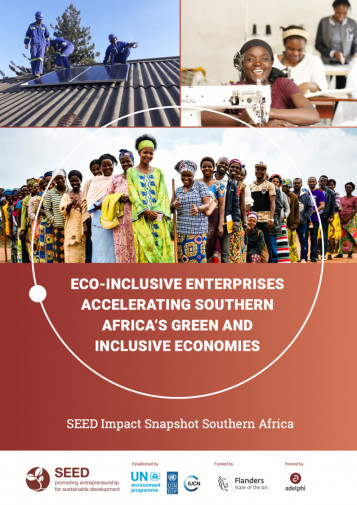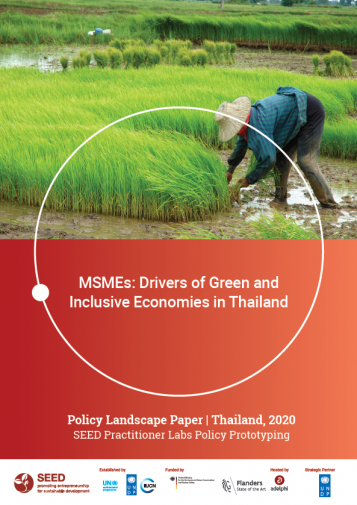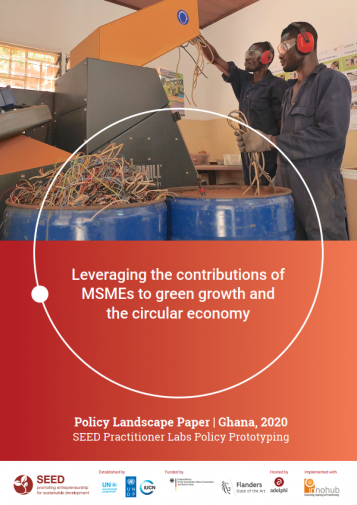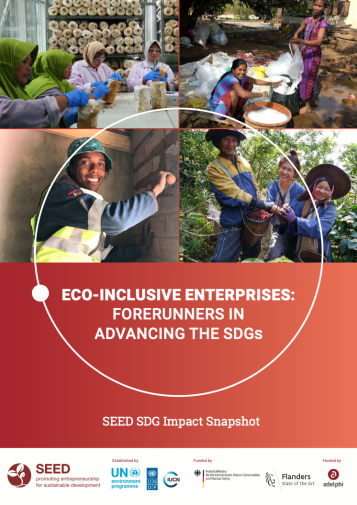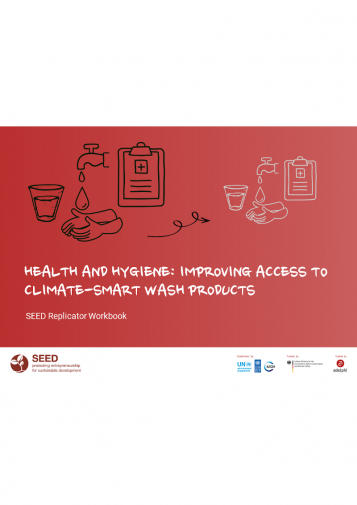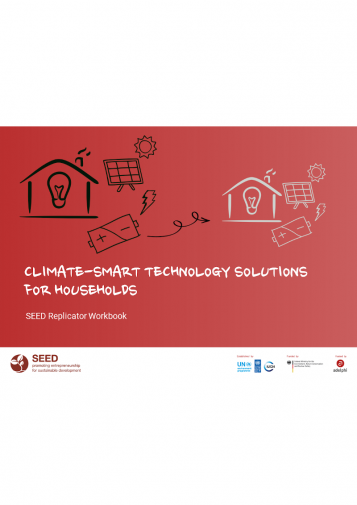SEED at COP28: Advocating for the role of SMEs
Published: 19 December 2023
SEED has been very active at COP28, organising 3 events, co-organising a 4th one, and contributing as to the panel of 4 other events. All had a common aim: advocating for the pivotal role of SMEs as gamechangers in the transition to circular and low-carbon economies. Read more
SDGs:































SDG Agrifood Accelerator Programme by FAO and SEED
Published: 15 February 2023
FAO and SEED have identified twelve Agrifood Innovators from SEED's portfolio of 358 enterprises for the first rendition of the SDG Agrifood Accelerator Programme. The Programme supports the selected innovators' pathway to scale up and links them with partners to strengthen their market development and innovation trajectories. Read more
SDGs:



















Sustainable Local Procurement | Policy Brief Indonesia
Published: 01 December 2022 Ade Afrilian, Camilla Shearman, Ivy Londa, Rizky Anugrah
The involvement of local MSMEs that provide sustainable goods and services in government procurement systems can drive the transition to a sustainable economy, provide job opportunities and local economic development, and accelerate the recovery from the Covid-19 pandemic. Read more
SDGs:





Sustainable Local Procurement | Policy Brief Indonesia (Bahasa Indonesia)
Published: 01 December 2022 Ade Afrilian, Camilla Shearman, Ivy Londa, Rizky Anugrah
Keterlibatan UMKM lokal yang menyediakan barang dan jasa berkelanjutan dalam sistem pengadaan barang dan jasa pemerintah dapat mendorong transisi menuju perekonomian berkelanjutan, memberikan lapangan kerja dan pengembangan ekonomi lokal, serta mempercepat pemulihan dari pandemi Covid-19 Read more
SDGs:





Insights from the Asia Future Lab for Innovation and Policy
Published: 04 October 2022
On October 4th 2022, SEED and GO4SDGs organised the Asia Future Lab for Innovation and Policy. The event was organised as part of the Global Future Lab series, bringing together around 30 regional SME stakeholders, such as policy makers, intermediaries and SMEs to co-create and develop future-proof solution. Designed to connect and leverage the expertise of these key stakeholders, the outcome of the Future Labs will inform a Sustainable SME Action Agenda. Read more
SDGs:

































Insights from the West Asia Future Lab for Innovation and Policy
Published: 26 September 2022
On September 20th 2022, SEED and GO4SDGs, together with the West Asia Sustainable Fashion Academy, organised the West Asia Future Lab for Innovation and Policy. The event was organised as part of the Global Future Lab series, bringing together around 30 regional SME stakeholders, such as policy makers, intermediaries and SMEs to co-create and develop future-proof solution. Designed to connect and leverage the expertise of these key stakeholders, the outcome of the Future Labs will inform a Sustainable SME Action Agenda. Read more
SDGs:

































Fostering the circular economy in India: Role of MSMEs
Published: 30 March 2022 Abdullah Mohammed Atiq, Amar Munnolimath, Mehar Kaur, Shweta Gautam
This policy brief looks at the role of MSMEs in catalysing the circular economy in India, and puts forward some recommendations and policy solution prototypes to support and unlock circular economy entrepreneurship. The recommendations and prototypes were developed as part of the SEED Practitioner Labs for Policy Prototyping in India, 2021. Read more
SDGs:







Climate Finance, Fin-techs and the Missing Middle in Thailand | Scoping Paper, Thailand 2021
Published: 16 August 2021 Mirko Zürker, Net Pornlumon Nirachatsuwan
This scoping paper provides the basis for the implementation of the collaborative, multi-step process of the SEED Hack for Climate Finance in Thailand in 2021. Thailand’s high environmental richness and fastly evolving landscape of small- and medium-sized enterprises (SMEs) present a significant opportunity for the country to meet its climate action and development objectives. In particular, climate-smart SMEs- offering products and services for climate change adaptation and/or mitigation- are well-positioned to absorb and scale the environmental, social, and economic impacts of global climate finance flows in line with Thailand’s climate action objectives. Read more
SDGs:







#GO4SDGs Presents: Innovative solutions for MSMEs in a green recovery
Published: 13 July 2021
#GO4SDGs Presents: Innovative solutions for MSMEs in a green recovery was an official side event at the 2021 High-level Political Forum on Sustainable Development hosted jointly the GGKP, SEED and the United Nations Environment Programme (UNEP). Read more
SDGs:

































Meet the SEED Awards 2021 Winners and Runners-up
Published: 13 July 2021
Announcing the winners of the 2021 SEED Awards for Entrepreneurship in Sustainable Development, at the UN’s High-level Political Forum on Sustainable Development (HLPF). Read more
SDGs:































SEED Awards 2021 Winners
Published: 13 July 2021
The SEED Awards for Entrepreneurship in Sustainable Development is an annual awards scheme designed to identify the most innovative and promising locally led start-up eco-inclusive enterprises in developing and emerging economies. Read more
SDGs:

































SEED Awards 2021 Runners-Up
Published: 13 July 2021
The SEED Awards for Entrepreneurship in Sustainable Development is an annual awards scheme designed to identify the most innovative and promising locally led start-up eco-inclusive enterprises in developing and emerging economies. Read more
SDGs:

































Mainstreaming Credit Assessment and Appraisal to Accelerate the Access to Finance for Solar MSMEs in India | Climate Finance, India 2020
Published: 24 November 2020 Kathrin Kirsch, Nithin Ramu
The climate finance solution developed by Tata Cleantech aims to mainstream the credit appraisal process for solar MSMEs by clustering SMEs, automation and standardisation of the credit assessment process, including a securitisation mechanisms to reduce collateral requirements and developing a secondary redeployment market for solar rooftop systems. Read more
SDGs:





Scale Up Lab, India 2020 | SEED Practitioner Labs Climate Finance
Published: 23 October 2020
Join us on 25th November for our digital Scale-Up Lab India 2020 to hear climate finance solution pitches, and learn how to get involved in driving forward these solutions! Read more
SDGs:







UNDP Indonesia's Innovative Finance for Renewable Energy in Small Coastal Island Communities | Climate Finance, Indonesia 2020
Published: 20 October 2020 Net Pornlumon Nirachatsuwan
UNDP Indonesia's Innovative Finance for Renewable Energy in Small Coastal Island Communities builds on existing efforts to allocate funds to leverage public funding and private sector investment in clean energy which creates financially viable interconnected renewable grids, specifically developing a hybrid PV-diesel power generation system in small islands. Furthermore, creating energy demand by building a local green economy. Read more
SDGs:





Equity Crowdfunding Platform for Green MSME Financing | Climate Finance, Indonesia 2020
Published: 20 October 2020 Maggie Sloan
The Equity Crowdfunding Platform for Green MSME Financing solution, developed by Perkumpulan Untuk Peningkatan Usaha Kecil (PUPUK) builds on existing efforts to use public capital to spur MSME growth. This solution will: (a) Attract private investors by offering a pipeline of bankable MSMEs in a one-stop-shop for MSME financing. (b) Aggregate green MSMEs through partner business development service providers (or intermediaries), where finance is released to MSMEs in aggregate working with the specific BDS provider who has delivered cleaner production and green business advisory to the specific MSMEs integrated into the platform. Read more
SDGs:





Building a Resilient Business Around Women: The story of Dagoretti
Published: 28 September 2020 Amanda Panella, Linde Wolters
Violet Matiru grew up without electricity on a farm at the outskirts of Nairobi, Kenya, an aspect of her life that led her to want to better the environment around her. From using kerosene lamps and lighting a fire every day with firewood for a cup of tea before school, she decided to support herself and her community by launching the Dagoretti Market Biogas Latrine. It has since moved from a core business of converting human waste from paid for latrines for market goers, to biogas to be reused for cooking and heating water, to other environmentally and socially relevant activities. Read more
SDGs:







Enterprise Resilience: Six Critical Factors to Protecting Your Start-Up’s Future
Published: 24 September 2020
To better understand what resilience means for MSMEs during the COVID-19 pandemic, SEED interviewed 30 eco-inclusive enterprises. Unsurprisingly, MSMEs have been strongly affected by the economic shock of the pandemic. From these interviews, SEED has outlined the six critical factors for protecting the future of your enterprise. Read more
Green Recovery Ecosystem Builder Programme: Making SME support programmes green, fair and recovery proof
Published: 10 September 2020
SMEs make up a significant portion of ASEAN economies and communities. Despite being impacted negatively by the pandemic, they are also key in driving local green and inclusive growth. The new Green Recovery Ecosystem Builder Programme is tailored for participants who lead programmes or departments and are responsible for the successful implementation of enterprise support services. Read more
Eco-Inclusive Enterprises: Accelerating Southern Africa’s Green and Inclusive Economies
Published: 02 September 2020
Micro, Small, and Medium Enterprises (MSMEs) provide 50% of jobs, contribute to over 35% of the GDP in emerging economies, and overall make up 90% of registered firms across the world. They are especially impactful in emerging economies as they work toward inclusive growth and equality for marginalised populations. At SEED, we focus on growing eco-inclusive enterprises which in turn contribute socially, economically, and environmentally to empowering the 5.2 billion people at the bottom of the pyramid worldwide.
This report examines the yearly impact of 80 of our eco-inclusive enterprises in three of our SEED countries: Zambia, Zimbabwe, and Malawi. These locally embedded enterprises, 51% of which are women-led, demonstrate that driving the Sustainable Development Goals (SDGs) can indeed be profitable and with a success rate of 82.5% still in business, they show long-lasting impact in each of their communities and sectors. Read more
This report examines the yearly impact of 80 of our eco-inclusive enterprises in three of our SEED countries: Zambia, Zimbabwe, and Malawi. These locally embedded enterprises, 51% of which are women-led, demonstrate that driving the Sustainable Development Goals (SDGs) can indeed be profitable and with a success rate of 82.5% still in business, they show long-lasting impact in each of their communities and sectors. Read more
SDGs:























MSMEs: Drivers of Green and Inclusive Economies in Thailand | Policy Landscape Paper, Thailand
Published: 01 September 2020 Linde Wolters, Panramon Mahasuwan, Sonya Ong, Supapim Wannopas
As a leader in the ASEAN region, Thailand’s policy frameworks are well aligned with ASEAN initiatives, UN Sustainable Development Goals (SDGs) and Paris Agreement. Various stakeholders including those in the MSME ecosystem are working towards achieving the Thailand 4.0 industrial policy, a long-term vision to transition the country into an innovation-based economy, with a focus on technology, creativity and services. This policy landscape paper provides a brief overview of the social and environmental impact entrepreneurial ecosystem in Thailand. It serves as the background for the Practitioner Labs for Policy Prototyping hosted by SEED with UNDP Thailand as strategic partner. Read more
SDGs:







Leveraging the contributions of MSMEs to green growth and the circular economy in Ghana | Policy Landscape Paper
Published: 01 September 2020 Camilla Shearman, Doris Awortwi-Tandoh, Julia Haack, Kodjo Barnor, Letitia Varney, Linde Wolters, Thomas Wiredu
The policy context as it relates to MSMEs in Ghana is in a state of transformation. With a new MSME Policy on the horizon that seeks to align and coordinate efforts to support this stakeholder group, it is an opportune moment to look at the social and environmental contributions of MSMEs to Ghana’s development priorities, and how policy solutions can leverage these contributions. Furthermore, as MSME activities in specific sectors – for example in the waste management sector – receive increasing attention, there is opportunity for a coordinated effort to address challenges.
By bringing together different perspectives and experiences, the SEED Practitioner Labs for Policy Prototyping provides an opportunity to build partnerships and holistic solutions. Read more
By bringing together different perspectives and experiences, the SEED Practitioner Labs for Policy Prototyping provides an opportunity to build partnerships and holistic solutions. Read more
SDGs:





Eco-Inclusive Enterprises: Forerunners in Advancing the SDGs | SEED SDG Impact Snapshot
Published: 15 July 2020 Linde Wolters, Mirko Zürker, Net Pornlumon Nirachatsuwan
As governments respond to the wide-ranging problems resulting from the COVID-19 crisis, it’s worth thinking about how we may take this opportunity to shift towards a green economy. Because the way we recover from this crisis will impact our fight against climate change and our progress towards achieving the 2030 Sustainable Development Agenda.
A green recovery calls for investments in solutions that provide social, environmental and economic benefits to people, especially those in vulnerable and marginalised communities. SEED-supported eco-inclusive enterprises and other Micro, Small and Medium-sized Enterprises (MSMEs) already promote green-technologies while including low-income people in their value chain.
The SEED Impact Snapshot helps to reveal the versatility of the impact of eco-inclusive enterprises. It also helps to clarify where there is the biggest potential for their SDG contributions and how policymakers may help unlock that potential further. Read more
A green recovery calls for investments in solutions that provide social, environmental and economic benefits to people, especially those in vulnerable and marginalised communities. SEED-supported eco-inclusive enterprises and other Micro, Small and Medium-sized Enterprises (MSMEs) already promote green-technologies while including low-income people in their value chain.
The SEED Impact Snapshot helps to reveal the versatility of the impact of eco-inclusive enterprises. It also helps to clarify where there is the biggest potential for their SDG contributions and how policymakers may help unlock that potential further. Read more
SDGs:



























Health And Hygiene: Improving Access To Climate-Smart WASH Products: Replicator Workbook
Published: 07 July 2020
Water is one of the main channels through which people, ecosystems and economies will feel climate change impacts. Missing access to Water, Sanitation and Hygiene (WASH) still poses challenges to people worldwide, while unsustainable products and services can have a big negative impact on both human and environmental health. Access to climate-smart WASH products & services leads to healthier lifestyles on personal and community levels while equally promoting environmental action. With eco-friendly yet innovative products, you can decrease vulnerabilities or tap into a growing market of environmentally-conscious customers. Exploit this potential and set up your own eco-inclusive enterprise providing access to climate-smart WASH products & services. Learn from proven business models around the globe and take the first steps towards offering sustainable solutions to your community. Read more
SDGs:





Climate-Smart Technology Solutions For Households: Replicator Workbook
Published: 07 July 2020
Energy production and consumption are the largest sources of global greenhouse gas emissions. Economic development will increase people’s need for access to reliable and affordable energy further. Smart energy solutions focus on making climate-smart technology available and affordable to households. These solutions have the potential to improve living conditions and strengthens the economic conditions of communities. They come from renewable sources, make use of an off-grid design, or, through their energy efficiency and conservation, avoid and reduce emissions. Innovative energy products improve accessibility to climate-smart technology and provide additional capacity-building in rural areas through technical training. Get inspired by a range of proven business models and learnings on how to set up your own enterprise to create such benefits for households in your community. Read more
SDGs:







